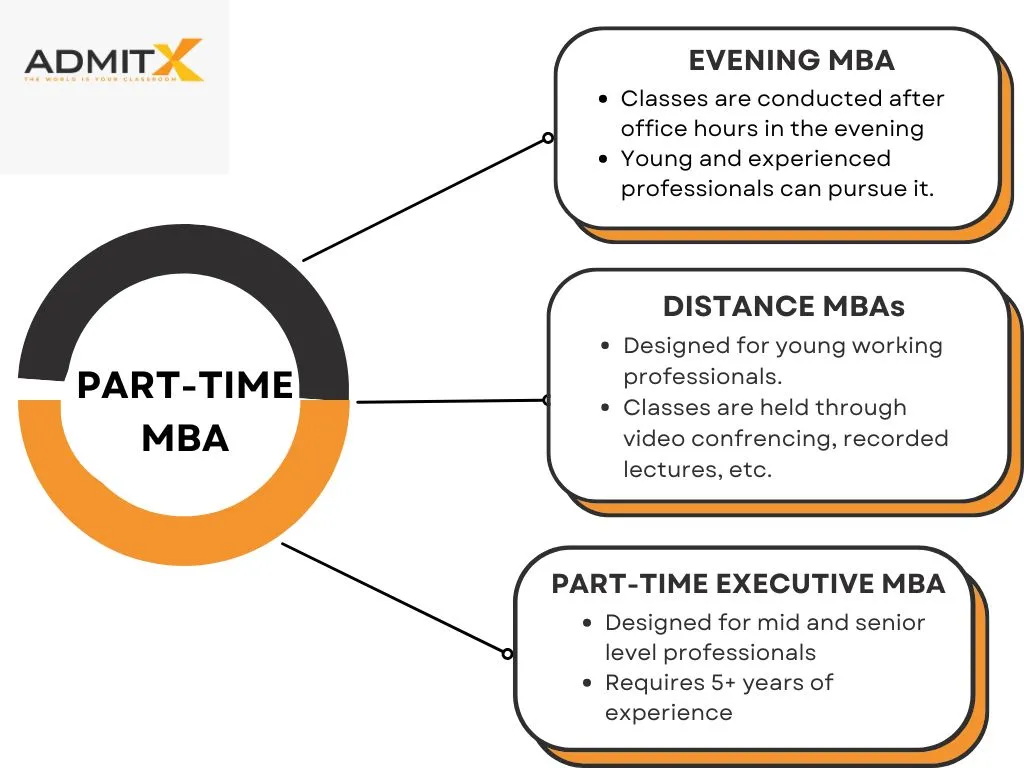
Part-Time MBA Guide: Structure, Syllabus & Application Process
Master of Business Administration or MBA is not only for university-attending students but also for working professionals. Yes, you read it right! Several institutes presently offer young and experienced working professionals the chance to boost their careers by taking admission into part-time MBA programs. Since it has various advantages so now the course is gaining popularity.
In this blog, you will learn about those benefits, including the course’s structure, syllabus, and application process.
- What is a Part-Time MBA?
- Advantages of a Part-Time MBA Program
- Differences between Full-Time & Part-Time MBA Programs
- Other Types of Part-Time MBA Program
- Affordable Part-Time MBA Colleges
- Best Part-Time MBA Colleges
- Part-Time MBA: Study Intakes
- Structure of Part-Time MBA Program
- Part-Time MBA Specialisations
- Eligibility Criteria
- Documents Required
- Application Process
- Conclusion
- FAQs
What is a Part-Time MBA?
A part-time MBA is a PG-level academic-cum professional course for working professionals who cannot afford the time and money to pursue a full-time MBA course. The course is designed for those wanting to upgrade their knowledge and career scopes without leaving the profession. A part-time MBA program allows students to attend classes on weekends or according to their flexible schedules. The coursework and curriculum of this program are similar to those of a full-time program, and it also offers several career benefits.
Mainly, there are two types of part-time MBA programs: lockstep and self-paced. Lockstep or cohort means an individual is enrolled with a set class of students, whereas self-paced means they can complete their courses more flexibly.
Advantages of a Part-Time MBA Program
Here, we have listed some of the significance and advantages of pursuing a part-time MBA program from abroad universities:
No Need to Leave Job: Unlike full-time MBA programs, working professionals who want to pursue part-time MBA programs are not required to leave their profession. They can commence their academic journey while still employed.
Flexibility: Working professionals have many responsibilities, such as family, social, and work responsibilities. A part-time management course can offer them flexibility in fulfilling their duties and pursuing their interest in developing business skills. They can attend classes, make assignments, and take tests on their comfort.
Career Opportunities: One motivation for pursuing part-time management courses is to enhance one’s professional capabilities and build the skillsets required for transitioning into leadership and management positions in the corporate sector.
Ideal for Corporates and Employers: The part-time MBA program is ideal for professionals who want to understand the market and businesses more deeply by studying them. It also helps them know industries’ current trends and future scope under various specialisations.
Also read – Best MBA Specialisation in Abroad
Differences between Full-Time & Part-Time MBA Programs
Several aspects of both programs are similar, such as coursework, curriculum, subjects, specialisations, etc. However, some factors make them unique and create differences. Let’s examine those differences and understand what makes a part-time MBA program unique and popular.
| Features | Full-Time MBA | Part-time MBA |
|---|---|---|
| Duration | 1-2 Years | 2-3 Years |
| Classes | Full-time classes | Classes are not regular, held on weekends, or fixed schedule |
| Mode | Offline mode | Blended mode |
| Core Subjects | Accounting Economics Finance Banking Business Strategy Operations etc. | Accounting Business Operations Leadership & Team building Operation HR Management Communication |
| Pedagogy | Classroom exposure Case studies Dissertation Internships Presentation | Case Studies Projects Assignments Presentation Research Papers |
| Tuition Fees | INR 20 Lakhs-90 Lakhs | INR 25 Lakhs-1 Crore |
| Minimum Work Experience | 2-4 Years | 3-5 Years |
| Top Countries | USA UK France Canada Australia | USA UK Singapore Canada Germany |
Other Types of Part-Time MBA Program
A part-time MBA program can be pursued in several ways, as mentioned below:
Evening MBA
- Working professionals are allowed to participate in classes usually conducted in the evening after working hours to develop expertise in managerial skills.
- Classes are conducted for 2-3 hours. The schedule prevents students from missing office work while they pursue a part-time MBA.
Distance MBAs
- This MBA program offers excellent flexibility to working professionals as the classes are conducted online.
- Sometimes, it is sufficient to watch the recording lectures if due to some reasons, classes are missed. Students can study from anywhere in the world.
Part-Time Executive MBAs
- This MBA program is pursued by mid- and senior-level executives, both online and offline.
- It required 5+ years of working experience.

Affordable Part-Time MBA Colleges
We have listed below some affordable part-time MBA colleges, along with their average tuition fees per year.
| University | Average Tuition Fees (per year) |
|---|---|
| McGill University | CAD 30,000 |
| University of British Columbia | CAD 32,500 |
| University of Alberta | CAD 31,500 |
| Tsinghua University | RMB 18,50,000 |
| Shanghai University of Finance | RMB 15,00,000 |
| University of Zurich | CHF 30,000 |
| Berlin University of Economics & Law | EUR 19,000 |
| University College Dublin | EUR 20,000 |
| University of Amsterdam | EUR 14,000 |
Best Part-Time MBA Colleges
We have listed below some best part-time MBA colleges, along with their QS World University Rankings 2025
| University | QS World University Ranking 2025 | Average Tuition Fee (per year) |
|---|---|---|
| Standford Business School | 6 | USD 82,000 (INR 68 Lakhs) |
| University of Chicago | 21 | USD 67,000 (INR 55 Lakhs) |
| University of Pennsylvania | 11 | USD 60,000 (INR 50 Lakhs) |
| London School of Business & Economics | 50 | GBP 125,000 (INR 1 Crore) |
| Imperial Business School | 2 | GBP 61,000 (INR 64 Lakhs) |
| Boston University | 108 | USD 70,000 (INR 58 Lakhs) |
| HEC Paris | 4 | EUR 90,000 (INR 80 Lakhs) |
Part-Time MBA: Study Intakes
Entry into part-time MBA programs can be made throughout the year in various intakes. However, the availability of the program is also based on the university and the course demand. Below, we have mentioned the different intakes in which universities accept admissions for part-time management programs.
| Study Intakes | Application duration (for 2025 year) | Start of Class |
|---|---|---|
| Fall (Sept-Dec) | October-January/February 2024 | September 2025 |
| Spring (Jan-May) | July-November 2024 | January 2025 |
| Summer (May-Aug) | November-January/February | May 2025 |
Structure of Part-Time MBA Program
The structure of the part-time MBA program is designed to fulfill the aspirations of the students, not only on a personal level but also academically, which can help them navigate their career paths easily. The curriculum of the course is distributed into various pedagogical tasks or objectives, as pointed out below:
- Classroom exposure
- Case studies
- Dissertation
- Internships
- Presentation
These pedagogical objectives cover the following types of academic modules:
Primer
- Quantitative Methods for Managers
Core Modules
- Strategy
- Marketing
- Microeconomics
- Data-driven Decision-making
- Data Science and AI for Business
- Leadership in Practice
- Operations Management
- Managerial Finance
- Corporate Finance & Governance
- Sustainability Management
- Managing Innovation & Corporate Transformation
- Advanced Management Control Systems
- Understand the Organisation
- Managerial Accounting
- Organisational Management & Behaviour
Focus Modules
- Innovation & Digitalisation
- Sales & Negotiation
- Management Analytics
- Advanced Finance & Acquisitions and Mergers
- Leadership Communication & Stage Rules
- Conflict Management
- Dealing with Failure
- Mental Health First Aid
- Self-Management Tools
Management Workshops
- Design Thinking
- Visualizing your Idea
- Strategy Consulting
- Coding Workshop
- Machine Learning
Projects
- Applying the knowledge to a new venture or partner company in a real business scenario
- Handling competencies in real business situations
- Put sustainability into action.
- Projects might differ depending on the institute.
Leadership Curriculum
- Self-organisation & Time Management
- Personal Branding
- Self-Pitching
- Team Building
- Project Management
- Crisis & Conflict Management
- Company visits
- Club Events
- Industry Days
Part-Time MBA Specialisations
Below, we have enlisted the specialisations which are popular among students and hold future potential in terms of employability as well as demand in the corporate sector:
- Finance
- Sales
- Marketing
- International Business
- Business Analytics
- Human Resource Management
- Operations Management
Eligibility Criteria
To get admitted into a part-time MBA college, the following criteria should be met:
- Students must have a bachelor’s degree in a relevant field (e.g., business management, economics, or commerce).
- Some universities may ask for post-graduate degree certification.
- Candidates must possess GMAT/GRE scores.
- Candidates must also possess the expertise in English language.
- Candidates must have at least 3-5 years of working experience in an executive or leadership position.
- They must have strong verbal and written communication skills.
- They must have listening skills.
- An interest in areas outside of their immediate environment.
- Willingness to engage in debate and to ask questions.
It should be noted that the requirements and eligibility criteria might differ depending on the institute.
Documents Required
The following documents must be submitted while applying for a part-time MBA program in any country. This list is very general and not specific to any institute:
- Previous academic certificates and transcripts from all previous educational institutions attended.
- Standardised language proficiency test scores such as TOEFL/IELTS/PTE.
- GMAT/GRE Scorecard
- 2-3 Letters of Recommendation.
- 1-2 Statements of Purpose.
- CV or Resume.
- 2 Passport-sized photographs.
- A work experience certificate (3-5 years) to demonstrate managerial skills.
- Valid Passport.
- Non-refundable application fee (depending on the university/college).
- Identity Card
- Health Insurance documentation.
- Bank Statement
Application Process
- To apply for the part-time MBA course, candidates must visit the official website of the institute into which they want to get admission.
- They can proceed with the application process by filling in the mandatory details, such as personal, academic, and professional details, on the application form.
- Upload the required documents.
- Pay the application fee
- They are now done with the application process.
- Some private universities conduct entrance exams for international students to judge their competency for admission. If so, students should review the test syllabus, prepare, and appear for the test.
- Candidates must wait at least 2-3 months for the institute’s reply.
Conclusion
A part-time MBA course is specially designed for those working professionals who are not able to pursue a full-time MBA program due to lack of time or money. This helps them to strengthen their skills and leadership qualities required for a successful professional life without leaving their current employment. It also allows them to build networks with other experienced professionals. The tuition cost of the course varies significantly depending on the institute and the country.
FAQs
Why is the part-time MBA program duration higher than the full-time MBA?
Since the curriculum of the part-time MBA program is almost similar to that of a full-time course and students need to spend only 3-4 hours per week to complete their credits, the duration of this course is higher than the full-time MBA program.
Is a part-time MBA worth it?
Yes, it is both valuable and worthwhile to pursue the part-time management program since it is designed to cater to the needs of young and experienced working professionals, such as inculcating leadership qualities, fostering management skills, time management, etc., which are required to sustain in the corporate world.
What are the career opportunities after a part-time MBA course?
Students do not get any direct placement or job opportunities right after completing the program since they are already working professionals. The companies themselves sponsor most working professionals pursuing the part-time MBA. The skills they include help them reach greater heights in their careers.
Is CAT required for the part-time MBA program?
In foreign universities, to pursue any MBA program, it is required to have a GMAT or GRE score rather than a CAT. However, some abroad institutes offer admission into the part-time MBA program on CAT score.
In which mode are part-time MBA classes conducted?
Unlike a full-time MBA program, it is conducted in both online and offline mode.
If you are an aspirant looking to study at your dream university, book an appointment with AdmitX today and start your applications early to avail yourself of all the benefits.








